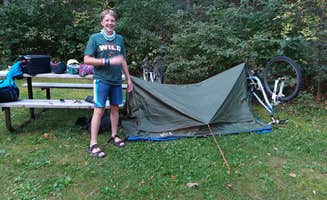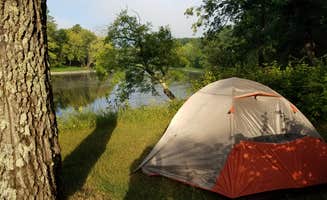Tent camping near North Shore, Minnesota provides access to the Mississippi River headwaters region with numerous water-accessible sites. The area experiences average summer temperatures between 70-85°F during peak camping season from May through September. Several riverside locations remain undeveloped with minimal facilities, while established sites within state parks offer more amenities.
What to do
Paddle and camp combo: The Mississippi River Headwaters Water Trail connects multiple camping locations where paddlers can make overnight stops. At Baxter Canoe Camp, campers find "two spots off the water where you can get out of a canoe and hit dry land. The first has some stairs, but they are VERY steep."
Fishing access: Several campgrounds provide direct access to productive fishing waters. One visitor to Linwood Resort & Campgrounds noted "Lake Osakis is usually pretty good for fishing" and appreciated the "screened-in fish cleaning house" available on-site.
Historic site exploration: Campers staying at water-accessible sites can explore nearby historic locations. Those at Crow Wing State Park can "hike the trails, visit and learn about the historic townsite and the Red River Oxcart Trail that went through in the 1800's, and visit scenic overlooks around the park, including the confluence of the Crow Wing and Mississippi Rivers."
What campers like
Riverside tent locations: Many sites feature strategic placement along waterways. One camper at Baxter Canoe Camp found the "tent pad was level! No joke...flat as a pancake and right on the river" and appreciated that "some larger rocks just off shore made the water sing a bit when the water sloshed over them."
Amenity surprises: Some primitive sites offer unexpected conveniences. A visitor described finding "trashcans...an outhouse style building with a pit toilet and...guys are going to love this...a urinal!" plus "a giant, huge, monstrous sized pile of firewood. The DNR had left it there."
Lake activities: Campgrounds with lake access provide additional recreation options. At Cozy Corners, visitors enjoy "a park, baseball field, lodge, fish cleaning building, indoor pool, bathhouses, and laundry center. Located on long lake on the horseshoe chain if you like to fish!"
What you should know
Registration requirements: Most water-accessible camping areas have specific check-in procedures. At Mississippi River County Park, the "canoe campsite is accessible from the river. Camping is allowed for those traveling by canoe and limited to one night of camping with no overnight vehicle. First come-first serve; Register onsite."
Wildlife encounters: Bears are present in the region, requiring proper food storage. One camper reported, "We did have a nighttime visitor in the form of something big and black and furry...heard the sounds of a bear...Fortunately, we had properly hung our food in a tree."
Seasonal considerations: Water levels fluctuate throughout the season, affecting site accessibility. Campgrounds like Baxter Canoe Camp are listed as "Open as long as you can reach it on the river," making late summer visits potentially challenging during dry years.
Tips for camping with families
Multi-use campgrounds: Several locations offer activities beyond water sports. At Old Wagon Camp Ground, families find a "very clean lake, peaceful" environment with market facilities and shower access for added comfort during extended stays.
Bicycle access options: Some camping areas accommodate alternative transportation methods. One camper at Crow Wing State Park "was bike riding the Paul Bunyon Trail and rode into Crow Wing in the dark. I self registered because the office was closed (wrote in canoe site since you can't reserve it online)."
Emergency preparation: Cell service varies significantly throughout the region, with many water-accessible sites having limited or no coverage. Pack first aid supplies, maps, and emergency contact information specific to each location.
Tips from RVers
Limited RV options: Most water-accessible tent sites do not accommodate RVs, but some riverside campgrounds offer both. Those seeking RV camping with water views should contact campgrounds directly to verify seasonal accessibility and site dimensions.
Water-adjacent alternatives: When water levels are unsuitable for direct water access, consider nearby established campgrounds. Several locations offer both primitive and developed sites within walking distance of waterways.



